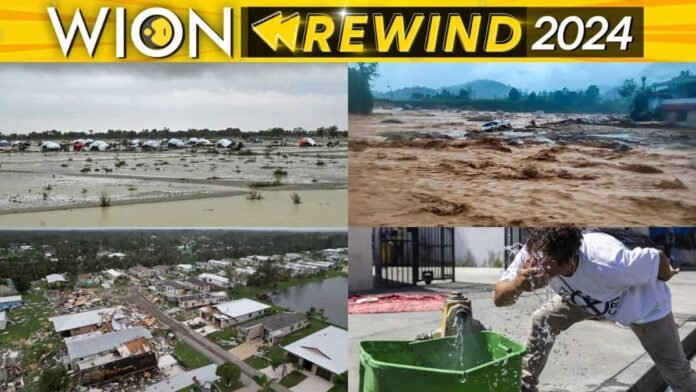Climate change is a term that has become increasingly common over the years. With many heatwaves, natural disasters and extreme weather conditions being attributed to the climate crisis, it is hard to ignore its grim presence in our lives. But what does it mean exactly?
What is climate change?
Climate change is a long-term shift in the weather patterns and temperatures globally. While it can also happen naturally, human activities like the burning of fossil fuels have been the driving cause of it since the 1800s.
According to the United Nations, the average temperature of the Earth’s surface has surged by 1.2 degrees Celsius. Experts have warned of limiting global temperature rise to not more than 1.5 degrees Celsius to prevent catastrophic environmental impacts, with various international agreements and frameworks in place, such as the Paris Agreement and the UN Framework Convention on Climate Change. However, projections based on current global policies indicate the Earth could experience warming of up to 3.1 degrees Celsius by the end of the century.
Extreme weather events wreaked havoc globally
The year 2024 saw deadly natural disasters fueled by climate change. Increasingly frequent heatwaves, wildfires, hurricanes, droughts and floods left thousands dead and millions affected with damages in billions.
The Atlantic hurricane season recorded 18 named storms, including 11 hurricanes–five of which were Category 3 or higher. Deadly hurricanes Beryl, Debby, Helene, and Milton claimed over 330 lives and caused damage costing hundreds of billions of dollars.
More than 670 people died in Papua New Guinea after an earthquake and landslide hit northern parts of the country. Floods and landslides also wreaked havoc in Southern Brazil killing nearly 60.
In Afghanistan and Pakistan, more than 300 people died in May when flash flooding damaged or completely destroyed at least 6,000 homes after heavy rainfall.
In southern India, landslides in Kerala followed by torrential rain resulted in nearly 400 deaths in the Wayanad district. Super typhoon Yagi killed nearly 600 people in Southeast Asia in September. Flash floods in southeast Spain and western Europe in late October resulted in over 200 deaths.
Climate change also increased droughts, torrential rainfall, and heat that damage crops resulting in food shortages, increased prices and losses for the agriculture industry globally.
Deadly heatwaves claimed lives across the world
While natural disasters resulted in an increased death toll this year, heatwaves across the Earth were felt by the majority of people during the summer of 2024.
Most parts of the world experienced record-high temperatures and heatwaves that claimed thousands of lives, although the exact number cannot be determined.
According to the World Meteorological Organisation, the global mean surface air temperature was 1.54 degrees Celsius above the pre-industrial average from January to September.
July 22 marked the hottest day on Earth after the global average temperature reached a record high of 17.15 degrees Celsius, according to NASA, the previous record being 17.09 degrees Celsius observed a day earlier on July 21.
Hundreds of deaths have been reported across Asia due to heatwaves, with people most impacted in countries including India, Bangladesh, Thailand, Philippines, Cambodia, and Myanmar after experiencing temperatures well above 40 degrees Celsius for several days due to climate change and El Niño effect.
A report released by HeatWatch claims that India recorded over 700 deaths and over 40,000 heatstroke cases attributed to climate change.
According to reports, over 1,300 people lost their lives during the Hajj pilgrimage in Saudi Arabia in June after temperatures soared to 52 degrees Celsius.
Similar trends were seen in Western African countries like Nigeria and Ghana which witnessed increase in patients with heat-related illnesses after temperatures recorded over 40 degrees Celsius in February. Australia also experienced an intense heatwave that affected several areas of the country with temperatures above 45 degrees Celsius.
Southern and Southeastern nations of Europe recorded over 19 deaths due to a heatwave after several regions recorded scorching high temperatures, especially in Greece and Italy, where most fatalities were recorded.
Southern and Western regions of the United States were severely hit by heatwaves, recording over 1,000 deaths, with the hottest temperature recorded at 54 degrees Celsius at Furnace Creek, Death Valley.
Mexico recorded over 150 deaths that could be linked to heat-related illnesses.
2024: A wake-up call
The number of lives lost due to just weather events directly is alarming. Many other innocent lives are lost due to climate change indirectly when it takes the form of deadly illnesses such as heart diseases, respiratory diseases due to air pollution, stroke, cancer and many other leading causes that can be linked to climate change.
The year 2024 should be a wake-up call for governments, policymakers, and us as individuals. Climate change is a pressing issue that and we need to look for solutions that can only be addressed by global cooperation and commitment.
Global bodies and governments should implement strict environmental measures like transitioning to renewable energy sources and reducing greenhouse gas emissions from burning fossil fuels.
Although this requires significant investments, we cannot ignore the immediate need to adapt to sustainable solutions and technologies to reduce our carbon footprint.
Looking back at 2024, if we don’t take urgent actions, one day our planet may not be fit for humanity to live on.
Every life matters. Every action counts, even at an individual level.
Disclaimer: The views of the writer do not represent the views of WION or ZMCL. Nor does WION or ZMCL endorse the views of the writer


